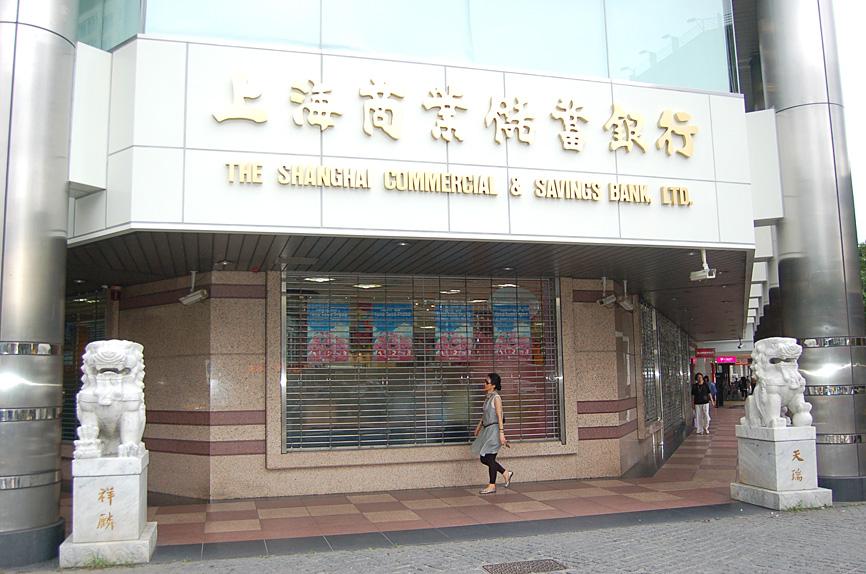Taiwan-based Shanghai Commercial and Savings Bank (SCSB, 上海商業儲蓄銀行) on Saturday said its board of directors had approved a proposal to pay a cash dividend of NT$1.8 per share.
The board also voted to sell NT$3 billion (US$104.85 million) of subordinated debentures this year to increase SCSB’s working capital, the bank said in a Taiwan Stock Exchange (TWSE) filing.
SCSB is to have its annual general meeting on June 17, at which it would seek shareholders’ approval for the two proposals, it said.

Photo: Yang Kuo-wen, Taipei Times
The bank reported earnings per share of NT$3.19 for last year, up from NT$3.01 the previous year. The proposed dividend represents a payout ratio of 56.43 percent, flat from last year.
Based on SCSB’s closing price of NT$49.55 on Friday, the planned payout would translate into a dividend yield of 3.63 percent, higher than the interest rates on fixed-term deposits offered by local banks.
SCSB on Friday became the latest financial institution in Taiwan to announce dividend plans.
A day earlier, CTBC Financial Holding Co (中信金控) announced it would distribute a cash dividend of NT$1.25 per share, the highest in the company’s history.
With CTBC Financial’s closing share price of NT$29 on Friday, the proposed payout represents a dividend yield of 4.31 percent.
Four of the 15 financial firms that have announced dividends so far would have dividend yields of more than 5 percent, TWSE data showed.
These are Yuanta Financial Holding Co (元大金控), King’s Town Bank (京城銀行), Concord Securities Co (康和證券) and President Securities Corp (統一證券).
CTBC Financial, SinoPac Financial Holdings Co (永豐金控) and Shin Kong Financial Holding Co (新光金控) have announced dividends with yields of 4 to 5 percent, while IBF Financial Holdings Co (國票金控), Far Eastern International Bank (遠東商銀) and Taiwan Cooperative Financial Holding Co (合庫金控) have dividend yields of 3 to 4 percent, the data showed.
Most financial institutions this year adopted a balanced dividend policy by distributing earnings to their shareholders in both cash and stock dividends. Only four companies — CTBC Financial, SCSB, King’s Town and Shin Kong Financial — are planning all-cash dividends.
The nation’s two leading financial conglomerates, Cathay Financial Holding Co (國泰金控) and Fubon Financial Holding Co (富邦金控), have yet to announce their dividend policies.

SEMICONDUCTORS: The firm has already completed one fab, which is to begin mass producing 2-nanomater chips next year, while two others are under construction Taiwan Semiconductor Manufacturing Co (TSMC, 台積電), the world’s largest contract chipmaker, plans to begin construction of its fourth and fifth wafer fabs in Kaohsiung next year, targeting the development of high-end processes. The two facilities — P4 and P5 — are part of TSMC’s production expansion program, which aims to build five fabs in Kaohsiung. TSMC facility division vice president Arthur Chuang (莊子壽) on Thursday said that the five facilities are expected to create 8,000 jobs. To respond to the fast-changing global semiconductor industry and escalating international competition, TSMC said it has to keep growing by expanding its production footprints. The P4 and P5

DOWNFALL: The Singapore-based oil magnate Lim Oon Kuin was accused of hiding US$800 million in losses and leaving 20 banks with substantial liabilities Former tycoon Lim Oon Kuin (林恩強) has been declared bankrupt in Singapore, following the collapse of his oil trading empire. The name of the founder of Hin Leong Trading Pte Ltd (興隆貿易) and his children Lim Huey Ching (林慧清) and Lim Chee Meng (林志朋) were listed as having been issued a bankruptcy order on Dec. 19, the government gazette showed. The younger Lims were directors at the company. Leow Quek Shiong and Seah Roh Lin of BDO Advisory Pte Ltd are the trustees, according to the gazette. At its peak, Hin Leong traded a range of oil products, made lubricants and operated loading

The growing popularity of Chinese sport utility vehicles and pickup trucks has shaken up Mexico’s luxury car market, hitting sales of traditionally dominant brands such as Mercedes-Benz and BMW. Mexicans are increasingly switching from traditionally dominant sedans to Chinese vehicles due to a combination of comfort, technology and price, industry experts say. It is no small feat in a country home to factories of foreign brands such as Audi and BMW, and where until a few years ago imported Chinese cars were stigmatized, as in other parts of the world. The high-end segment of the market registered a sales drop

Citigroup Inc and Bank of America Corp said they are leaving a global climate-banking group, becoming the latest Wall Street lenders to exit the coalition in the past month. In a statement, Citigroup said while it remains committed to achieving net zero emissions, it is exiting the Net-Zero Banking Alliance (NZBA). Bank of America said separately on Tuesday that it is also leaving NZBA, adding that it would continue to work with clients on reducing greenhouse gas emissions. The banks’ departure from NZBA follows Goldman Sachs Group Inc and Wells Fargo & Co. The largest US financial institutions are under increasing pressure